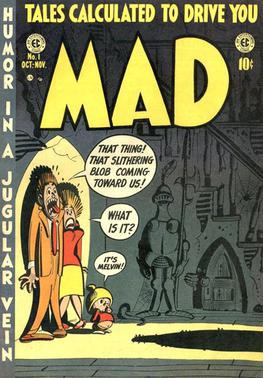Back when I was a kid, Mad Magazine supplied me with an unexpected life lesson wrapped in a multi-panel cartoon.
 Here is what I remember -- a series of images depicting insincere conversations. In each frame, two people stand, holding masks up to the sides of their head. They face you, the audience; Their masks face each other.
Here is what I remember -- a series of images depicting insincere conversations. In each frame, two people stand, holding masks up to the sides of their head. They face you, the audience; Their masks face each other.
One conversation takes place through the masks. A completely different one takes place toward the audience. I don’t remember the actual conversations, but I do remember the the gist of them. The masked dialogues are cordial and caring. But the truth comes out through what is said toward the audience.
“I can’t stand this guy.”
I found the cartoon funny enough to read a number of times. At the third or fourth perusal, a thought hit me. Each person holding up a mask did so because they assumed the mask facing them was real. A kind of obligation confined them -- “This person really seems to like me. I should go out of my way to pretend I like them too.”
It dawned on me that the masks were leading to a complete waste of time. What’s the use of having an insincere conversation with someone?

I had a friend in college (let’s call him Ralph) who was lots of fun. Occasionally, while hanging out with each other, we would run into someone on his I can’t stand this person list.
No matter who the person was or how high on the list they sat, Ralph would enter into a conversation involving statements like “I’m so happy to see you!” and “Why haven’t I heard from you recently?” Inevitably, as the conversation drew to a close, Ralph would add, “We should have lunch sometime. Call me!”
Often this would lead to numerous phone calls that Ralph would then ignore. “Why does this person keep bothering me?” Ralph would ask, clearly annoyed.
When I asked Ralph why he would request a call from someone he didn’t want to talk to, he explained that he was just trying to be polite. “What, do you want me to be rude?”
I restrained from pulling up my mask when responding.
Isn’t ignoring a requested call rude? And what’s so terrible about being attentive and polite during a conversation, but ending it with something like “It was good talking to you” or “Maybe we’ll run into each other again sometime”. Period.
Misleading others is inconsiderate. Wasting someone’s time is insensitive. Taking a gift that could have instead gone to someone appreciative is thoughtless and selfish.
“Has it ever occurred to you that this person who is ‘annoying’ you is only doing so because you led them to believe you wanted their attention? The time they are wasting on you would be better spent on someone who would appreciate their effort.”
Years later, Ralph thanked me for this conversation.

Perhaps we need to put on a brave face. Maybe we are afraid that if a dear friend understood the sacrifices we were making they would stop accepting our help. For these and plenty of other reasons, there are times in which donning a mask is the right thing to do.
But more often than not, a mask is an entirely unnecessary shield between ourselves and the outside world. It keeps others from knowing us, and it keeps us from knowing others.
According to Francis Bacon:
“The worst solitude is to be destitute of sincere friendship.”
This sounds just about right to me. I believe that one has to put their mask down in order to discover and cultivate this kind of connection.
For this reason, I kindly ask that you take off your mask. Know me and be known.












